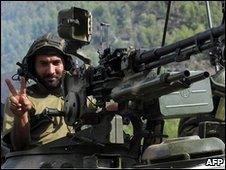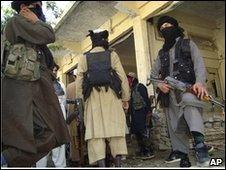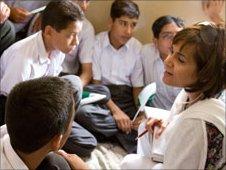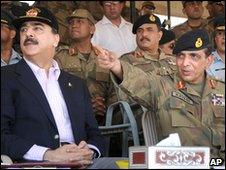Renewed strains between Islamabad and Washington
- Published

The army wants to spend 'vast funds' on an imagined Indian attack
Guest columnist Ahmed Rashid on rising tensions between the US and Pakistan over funding of the war against Taliban insurgents.
Pakistani officials are threatening to pull troops out from the sensitive north-western tribal areas unless the US and Europe comes up with more money for military campaigns.
Yet at the same time for a country that has staggering debt, inflation and unemployment, defence spending in the new budget has risen by 30% as compared to last year, even though the US is largely funding the war on terror.
Legislators say much of the newly appropriated money for the army will go to boosting defences against India rather than fighting militants in the Federal Administered Tribal Areas (Fata).
Military budget
When the $38bn annual budget was announced in parliament on 5 June, legislators sat up when it was announced that defence spending would be $5.2bn for 2010-11 - a rise of 17% compared to last year or 13.7% of the total budget.

Taliban fighters are moving back into Swat
Even more shocking news came a few days later when Saqib Shirani, principal economic adviser to the government, corrected that figure to say that actual defence spending for 2010-11 would be $7.9bn, a 30% rise compared to last year and 21% of the total budget.
The government did not disclose how it accounted for some $1.3bn received over the past year in Coalition Support Funds (CSF) by the US administration for fighting "terrorism".
The funds essentially pay for the army's deployments and operations in Fata and if that is the case than the question arises as to why the country needs such a huge increase in military spending.
For decades the army refused to allow any government to disclose the military budget.
Fuelling militancy
Now the army only allows a single blanket figure to be released that does not show what defence money is spent on.

The government is unwilling to spend money on education
Meanwhile substantial parts of military spending like army pensions and research and development are hidden in other budget items outside the official defence budget.
With 28% of the budget being reserved this year for servicing Pakistan's huge external debt of $54bn, nearly 60% of the budget is taken up by just two items - defence spending and debt servicing.
Almost the entire development budget of $9.2bn will be provided by outside donors.
Meanwhile the country spends just 2% of Gross Domestic Product (GDP) on education, despite the fact that average literacy is only 57%. Even the army admits that the lack of education is fuelling militancy.
However with the economy in a downward spiral and the government facing an internal funding crisis in the months ahead, Islamabad has begun to threaten the US.
Retired Lt Gen Syed Akthar Ali told parliament that the US government had for two years wilfully withheld billions of dollars of CSF that were owed to Pakistan.
''The time that we have to rethink our security priorities about external threats is approaching,'' Mr Ali warned recently.
"We will stop operations (in Fata) and go back to the eastern borders,'' he added threateningly.
However he admitted that in the past six months the US had released $1.3bn in CSF arrears, but was still holding back payments of $1bn.
'Grand disillusionment'
Prime Minister Yousuf Raza Gilani was equally blunt when he told visiting Richard Holbrooke, US special envoy for Pakistan and Afghanistan, that ''time is running out fast, public support can only be kept intact if the international community start delivering on their pledges.''
At a conference in Tokyo a year ago, major donors who make up the "Friends of Pakistan" pledged $5bn in aid, but so far few pledges have been honoured except by the US.
''There is grand disillusionment amongst the Europeans for Pakistan's refusal to address our concerns - transparency about aid funds, improving governance, using aid money to build up defences against India rather than fighting terrorism and its lack of concern for minorities,'' a senior European diplomat said.
Mr Gilani's recent trip to the European Union (EU) in Brussels, following the brutal killing of 90 Ahmedis in Lahore by militants was a public relations disaster, with the EU bluntly refusing to fund Pakistan unless it improved its governance record.
Yet even as Pakistani leaders cajole the West for more money and warn of an impending economic collapse, the army insists that the world must recognise Pakistan as a full blown nuclear power.
Contradictions
The chairman of the Joint Chiefs of Staff Committee, Gen Tariq Majid told the National Defence University in Islamabad recently that ''the world must accept our nuclear reality and stop unwarranted insinuations to create alarms and deny us the related benefits."
The army and the government wants to have its cake and eat it too.
It wants the US and Europe to pay for the war on "terrorism", but at the same time it wants to spend vast funds on building up defences against an imagined Indian attack - without improving relations with India.

The PM and army chief need to find a strategy to defeat a resurgent Taliban
It wants to be an acknowledged nuclear power, but is unwilling to spend money on education and health.
The army supports democracy but refuses to allow the civilian government to determine priorities for defence spending.
Meanwhile it is willing to threaten the US, knowing that with the US campaign in Afghanistan going so badly, Washington desperately needs Islamabad.
None of these contradictions in Pakistan's policy - or in its relations with the US - look like being resolved any time soon but the danger is that there is a growing tiredness amongst Western donors that Pakistan has cried wolf once too often.
Ahmed Rashid is the author of the best-selling book Taliban and, most recently, of Descent into Chaos: How the war against Islamic extremism is being lost in Pakistan, Afghanistan and Central Asia.
Here are some readers' comments on this column. To send your comments, use the form at the bottom of this page.
Great analysis once again. Pakistan has become famous in international diplomacy for being "the country which negotiates with a gun to its own head". To put it another way, we expect foreigners to care more for our well-being than we do ourselves! The Taliban are slaughtering our citizens in their homes but the fifth largest army in the world is still more concerned about India. If this is to continue, I suppose they really should go ahead and try to take Kashmir. At least we'll all have some place to move to after they lose Pakistan. Shehzad Shah, Karachi, Pakistan
The 3M (Military, Mullah, Militant) Corporation of Pakistan remains hale and hearty, so what if the so-called friends have butchered 2,500 Pakistanis in cold blood. And what is wrong with Pakistan employing tactical blackmail especially when friends have shown themselves to be very gullible. The only question to be asked is who is going to rescue Pakistan from the strategic depth they have buried themselves into. The financiers' finances are sinking rapidly and if the dollar was not the world's reserve currency, the US Treasury debt would be trading like a junk bond. Fersos, India
Pakistan has sacrificed more than any country in the world in the fight against terrorism. The Army has rendered great sacrifices and has set examples which other armies would like to follow. Other than military spending there is incalculable loss to businesses and economy. The West is doing too little and too slow. They seem to strangle Pakistan. Are they really serious to end terrorism? Nawaz Ahmad Minhas, Lahore, Pakistan
Very well written and probably too close for comfort for the Pakistani government. Reminds of an article I read recently where the author said "Pakistan has not yet decided what it wants to be when it grows up". Nick, Geneva, Suisse
So Pakistan wants to declare itself a global power and still roam the world with a begging bowl. The spineless Obama administration has shamelessly bowed to blackmail from Pakistan's army. We can continue to expect more violence and misery emanating from Pakistan. Never Mind, Japan
The article clearly shows how badly one can be blinded by the bias, as Ahmed Rashid has been while writing this article. Mr Rashid failed to give a balanced view on this important topic, which clearly seems to be intentional. How could Ahmed Rashid be ignorant of the fact that the US has been ignoring Pakistani concerns about the security of its western border (not allow India to use Afghan soil), and has increasingly been allowing India to strengthen its presence in Afghanistan. Did Ahmed Rashid not read the news that US has been ignoring Pakistan's requests for help to meet its energy needs while signing civil nuclear treaty with Pakistan's rival? Did Ahmed Rashid not know that US has opposed the China-Pakistan nuclear co-operation and Pakistan-Iran gas pipelines? What about Black Water's presence in Pakistan and espionage of its nuclear sites? Are these all matters of love? Clearly NOT. If Ahmed Rashid had been sincere he could easily have mentioned them as reasons for increasingly strained ties between Pakistan and US along with those he already presented to better view of the current scenario. Ghufran Tahir, Leeds, UK
Kudos for exposing the realities behind US-Pakistani relationship. Rather than trying to extract more money from US and Europe, Pakistan should try to have a more stable government and learn to stand on its own feet. Beastieboy, London, UK
In my humble opinion, the Pakistanis are facing a classic example of "spillover effect" from the ongoing conflict in Afghanistan. The US, Isaf and Karzai are not able to tame the Taliban-al-Qaeda and the Pakistanis are paying the cost for their failures in the Pakistani cities with the daily suicide bombings. The respected commentators like Ahmed Rashid put the blame for all the ills in South Asia on the Pakistani government; but the fact of a matter is that Pakistan is a developing country/weak state (not a failed state) and with that comes certain incapability of the Pakistani state; and that's why it is the international community's obligation to assist Pakistan by giving them the market access and invest in Pakistan by developing local infrastructure and also by investing in Pakistani businesses and creating local jobs for the Pakistani youth so that Pakistan can become a more stable state. Zulfiqar Ali, Oklahoma City, US
With all due respect to Mr Rashid, he just rewrites the obvious; this "guest" column is just a "filler", with no new or "out of the box" idea. In their private conversations with American journalists, even Obama administration people acknowledge that Kashmir is the key to the resolution of the wider conflict; it's the elephant in the room. Even Tariq Ali, the liberal-left British writer, calls Kashmir "the unfinished business of partition of 1947". If not for Kashmir dispute, there would be no nuclear or conventional arms race in South Asia. ISI would not need any proxy-fighters who would also have their own agendas. The military would lose its tight grip on the state. It would become so boring the experts on South Asia would have nothing to write about. M. Ahmed Alvi, Brookfield, IL, USA
Ahmed Rashid writes what the West likes and expects to hear, otherwise Mr Rashid will be discarded by the West and the BBC like a used chewing gum, cheques in pound sterling will dry up instantly. I will not be surprised if Mr Rashid will soon be invited to write articles for a newspaper from a country called Zionistan. Riaz Ahmad, Preston, UK
I think it is a good idea to withhold money until it is clear where the money goes. But it is risky, what if the money really is going for the correct purpose, and at the end it runs out? Pakistan is already in debt. It was not Pakistan's war in the first place, why should the Pakistanis suffer for the so-called war on terror! Ali, Karachi, Pakistan